Best Long-Term Crypto Picks for the 2025 Bull Market
%201.svg)
%201.svg)

In a market full of noise, value investors are asking one critical question: what should I hold long-term?
Here are some of our top picks, based on fundamentals, traction, and longevity.
1. Grass – AI + Revenue
Grass stands out in the AI space. With over $15M in revenue from its browser extension and data resale model, it’s one of the few protocols generating real-world value. It’s a top AI blue chip we’re confident holding over multiple cycles.
2. Peaq – DePIN Infrastructure
Peaq positions itself as the Chainlink of decentralized physical infrastructure. While still under $1B FDV, it’s been consistent in development and narrative strength.
3. Sui – Consumer-Focused L1
Sui isn’t just another L1. Between Phantom wallet support, SuiPlay hardware, and growing dApp adoption, Sui has the elements to outpace older chains like Solana or Avalanche in user growth.
4. Parcl – Real Estate Derivatives
For exposure to real-world assets, Parcl offers a compelling play. Their UI is retail-friendly, listings are strong, and the market cap remains under $150M. This is one to watch as RWA adoption grows.
5. BitTensor – AI Infrastructure Layer
With a unique emission model and growing subnet usage, BitTensor remains the top AI infra token. Some even compare its long-term potential to early Bitcoin.
Bonus Mentions:
- Uniswap / Aave / Compound – battle-tested DeFi with upcoming fee-sharing upgrades
- Chainlink – oracle king still dominating infrastructure
- Hyperliquid – sustainable revenue, EVM chain, and perps dominance
Final Words
The 2025 bull market will create noise—but also opportunity. These tokens aren’t just trendy—they’re infrastructure plays with real utility and upside. Allocate accordingly.
AI Agents in Minutes, Not Months


Create Your Free Token Metrics Account





.png)
Recent Posts
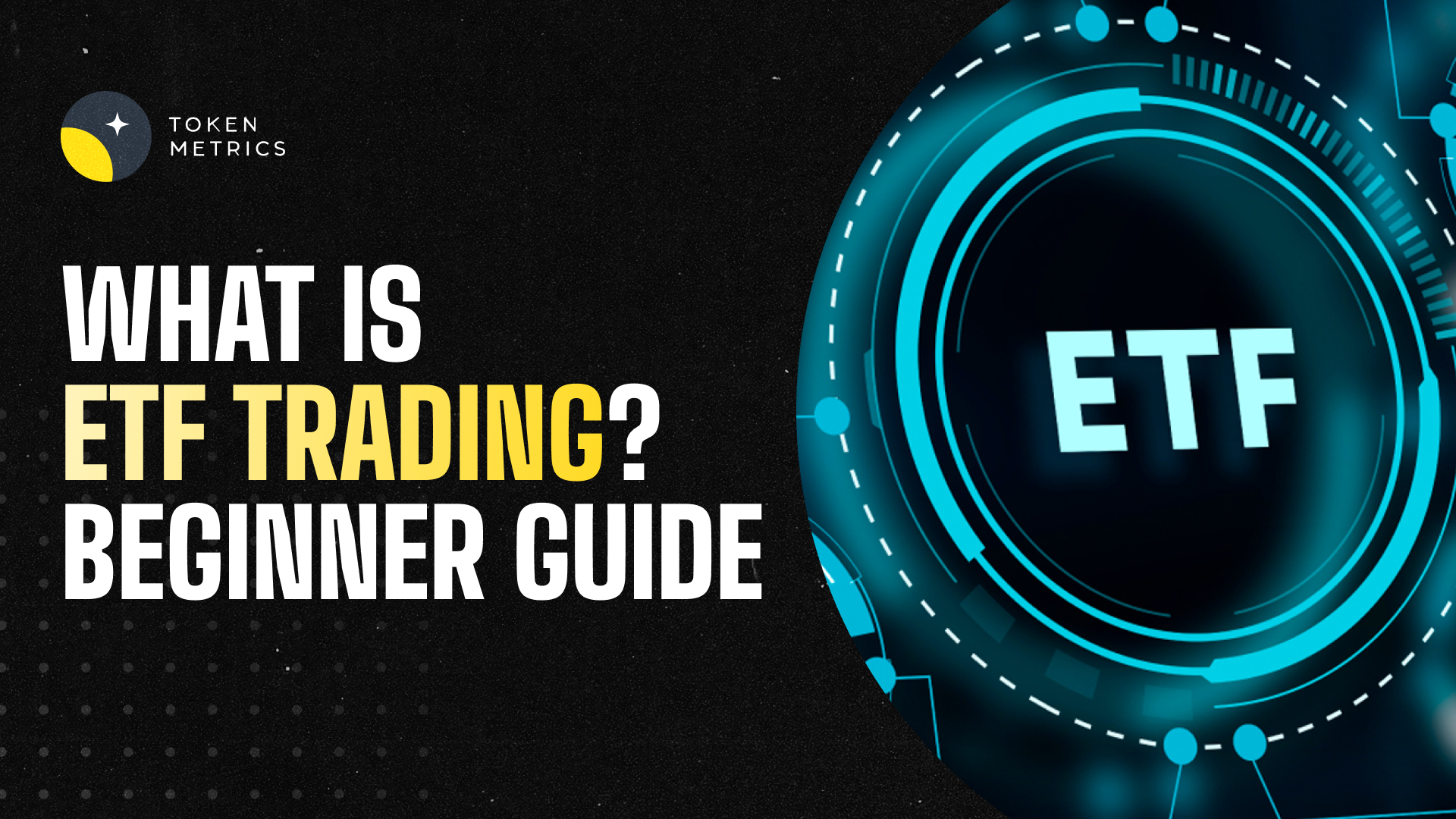
What Is ETF Trading? A Beginner’s Guide to Exchange-Traded Funds in 2025
%201.svg)
%201.svg)
In today’s fast-paced financial markets, ETF trading has become one of the most popular and accessible investment strategies. Whether you're a traditional investor or a crypto enthusiast, understanding how ETF trading works can help you make smarter, more diversified investment decisions.
📈 What Is an ETF?
An ETF (Exchange-Traded Fund) is an investment fund that trades on stock exchanges, similar to individual stocks. Each ETF holds a collection of assets, such as:
- Stocks (like the S&P 500)
- Bonds
- Commodities (like gold or oil)
- Currencies
- Cryptocurrencies (Bitcoin, Ethereum, etc.)
When you buy a share of an ETF, you're buying a fractional interest in the entire basket of assets. This makes ETFs a powerful tool for diversification, even for beginners.
💹 What Is ETF Trading?
ETF trading refers to the buying and selling of ETF shares on an exchange—just like you would with Apple or Tesla stock. The value of an ETF changes throughout the trading day, based on the underlying value of its assets.
ETF trading is commonly used for:
- Portfolio diversification
- Hedging strategies
- Thematic investing (e.g., AI, clean energy, DeFi)
- Speculating on short-term price movements
You can trade ETFs via your online brokerage, investment app, or even through certain retirement accounts (like IRAs).
🔄 How Does ETF Trading Work?
Here’s a simplified version of how ETF trading works:
- ETF Provider Creates the Fund
A company like BlackRock or Fidelity creates an ETF that holds a specific basket of assets. - ETF Listed on an Exchange
The ETF is listed on public stock exchanges such as the NYSE or Nasdaq. - Investors Buy and Sell Shares
Investors trade ETF shares just like stocks—prices fluctuate throughout the day. - Market Makers Maintain Liquidity
Authorized participants ensure ETF prices closely match the value of the underlying assets (called the Net Asset Value or NAV).
🪙 What About Crypto ETFs?
In 2025, crypto ETFs have emerged as one of the fastest-growing segments of the ETF market.
Crypto ETFs allow investors to gain exposure to cryptocurrencies without owning the actual coins. These ETFs are regulated, secure, and accessible through traditional finance platforms.
There are two types:
- Spot Crypto ETFs (hold actual crypto assets like Bitcoin or Ethereum)
- Futures Crypto ETFs (track the price of crypto futures contracts)
Example: BlackRock’s iShares Bitcoin Trust (IBIT) is a spot Bitcoin ETF with billions in assets under management (AUM) in 2025.
✅ Benefits of ETF Trading
ETF trading offers unique advantages for both retail and institutional investors:
1. Diversification
Instead of buying dozens of individual stocks, ETFs offer broad exposure to sectors, themes, or markets in a single trade.
2. Liquidity
ETFs trade like stocks—buy or sell at any time during market hours. This makes them more flexible than traditional mutual funds.
3. Cost Efficiency
Many ETFs have low expense ratios, often under 0.25%. You avoid the high fees associated with actively managed funds.
4. Accessibility
Trade ETFs using any brokerage account. You don’t need to be an accredited investor or a crypto expert.
5. Tax Advantages
ETFs are generally more tax-efficient than mutual funds due to the in-kind creation/redemption process.
⚠️ Risks of ETF Trading
ETF trading, like all investing, carries risks:
1. Market Risk
ETF prices can go up or down depending on market conditions.
2. Liquidity Risk
Not all ETFs are highly traded. Low volume can lead to wide bid/ask spreads and slippage.
3. Tracking Error
Some ETFs fail to perfectly mirror their benchmark, especially futures-based crypto ETFs.
4. Sector Risk
Thematic ETFs (e.g., blockchain, AI) can be highly concentrated and volatile.
🧠 How Token Metrics Enhances ETF Trading with AI
Whether you're trading traditional ETFs or crypto-focused ones, Token Metrics provides AI-powered tools to help you trade with confidence.
🔍 1. Real-Time Signals
Token Metrics offers AI-generated bullish/bearish signals for Bitcoin, Ethereum, and other assets—helping you identify the best time to enter or exit.

📊 2. Price Predictions
The platform generates short- and long-term price forecasts, using 80+ data points. This can help you anticipate ETF price movements, especially for crypto ETFs.
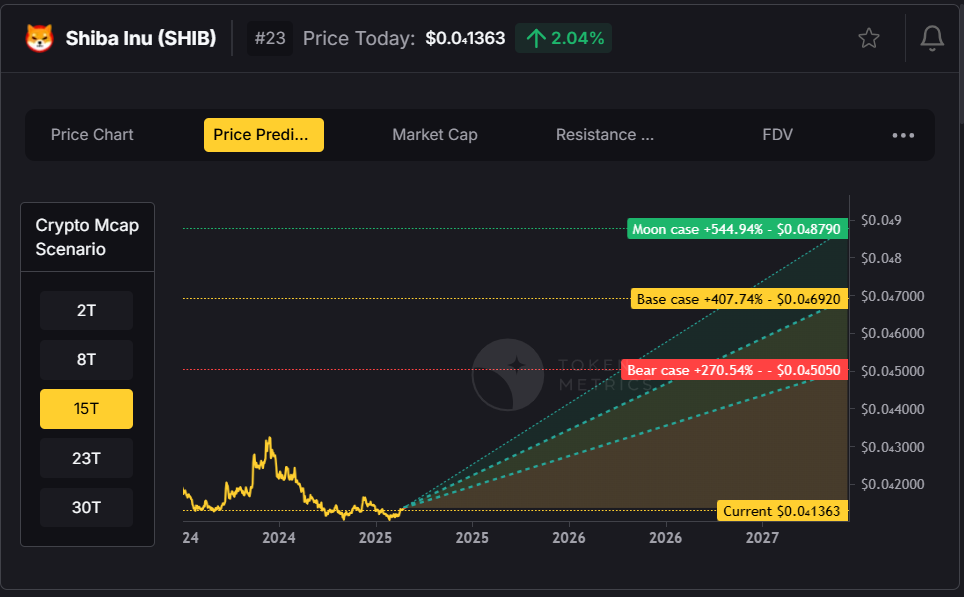
📈 3. On-Chain Data + ETF Flows
Token Metrics tracks exchange reserves, ETF inflows, and blockchain metrics—giving traders a unique edge not available on traditional brokerage platforms.
📣 4. Alerts and Custom Grades
Set up alerts based on trader grades, investor grades, and signal changes to react to market moves instantly.

🔥 Example: Trading Bitcoin ETFs Using Token Metrics
Let’s say you want to trade the BlackRock Bitcoin ETF in July 2025. Here’s how Token Metrics can help:
- AI signaled bullish BTC trend on June 28
- Price surged from $106,000 to $118,000
- ETF inflows increase as institutional demand grows
- You receive a buy alert from Token Metrics
- You enter the ETF early and ride the momentum
This combination of real-time AI alerts + institutional trend analysis gives you a significant advantage over traditional investors.
🧭 Final Thoughts
ETF trading has changed the game for investors. Whether you're looking to diversify your portfolio, gain exposure to crypto, or automate your trading strategy—ETFs provide a flexible, affordable, and efficient solution.
And in 2025, combining ETF trading with Token Metrics' AI-powered platform is one of the smartest ways to stay ahead.
With features like real-time signals, crypto ETF tracking, price predictions, and custom alerts, Token Metrics transforms how you approach modern ETF markets.
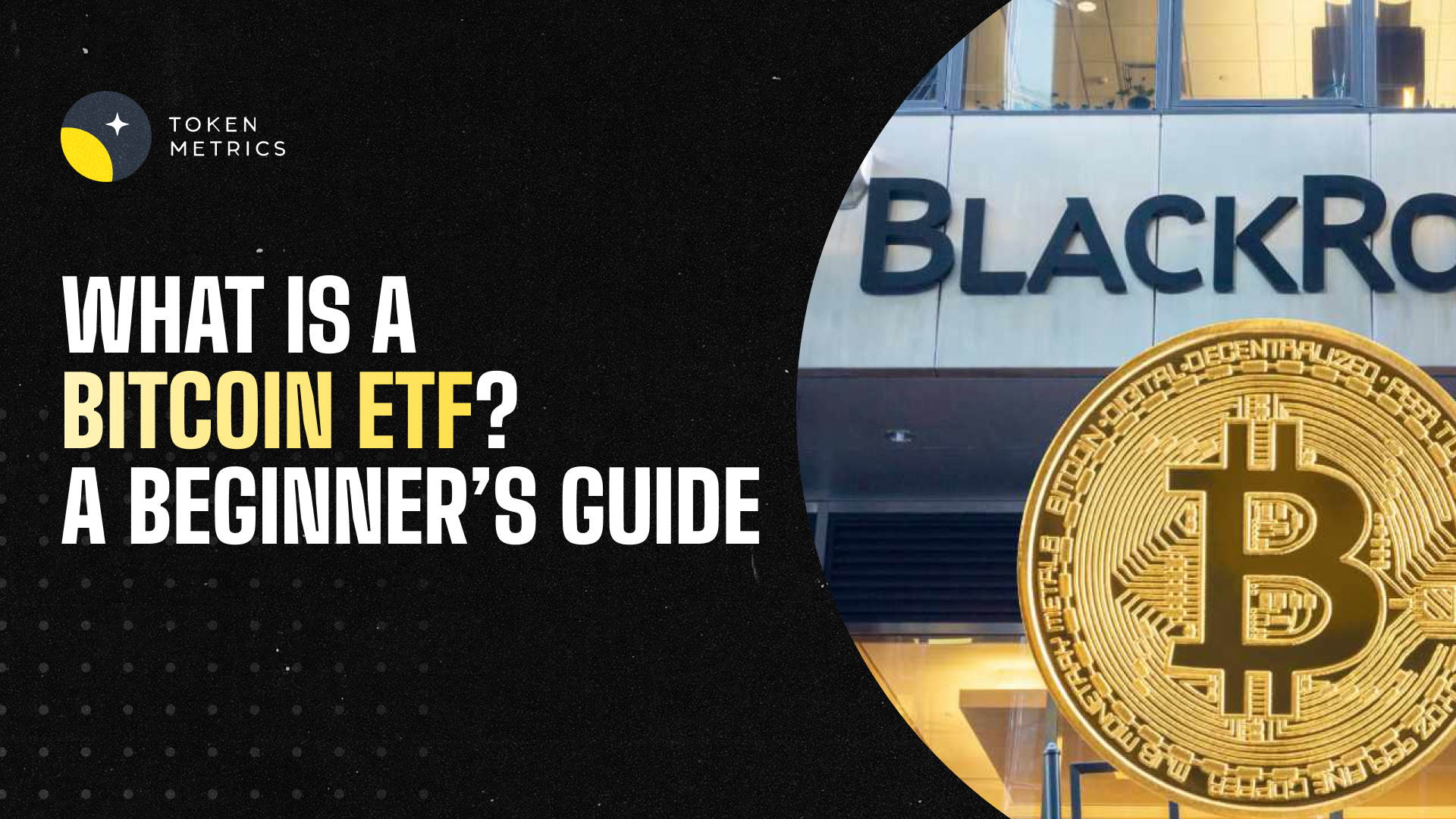
What Is a Bitcoin ETF? A Beginner’s Guide to Understanding Bitcoin Exchange-Traded Funds in 2025
%201.svg)
%201.svg)
The cryptocurrency world continues to evolve rapidly, and one of the most significant milestones in recent years has been the approval and rise of Bitcoin ETFs. If you’ve ever wondered, “What is a Bitcoin ETF and why is it important?” — this guide breaks it down in simple terms.
In this highly informative blog, we’ll explore:
- What a Bitcoin ETF is
- Types of Bitcoin ETFs
- Benefits and risks
- Why Bitcoin ETFs matter for crypto adoption
- How to analyze Bitcoin ETFs using Token Metrics tools
📈 What Is a Bitcoin ETF?
A Bitcoin ETF (Exchange-Traded Fund) is a financial product that allows investors to gain exposure to the price movements of Bitcoin without having to own or manage actual Bitcoin.
Just like buying a stock, investors can purchase shares of a Bitcoin ETF through traditional brokerage accounts. These shares represent ownership in a fund that tracks the price of Bitcoin.
In essence, a Bitcoin ETF bridges the gap between traditional finance and crypto investing.
🔄 How Does a Bitcoin ETF Work?
Bitcoin ETFs are created and managed by large financial institutions or asset managers. These funds:
- Buy Bitcoin directly (in spot ETFs), or
- Invest in Bitcoin futures contracts (in futures ETFs)
- Issue ETF shares that track the price performance of Bitcoin
These shares are then listed on stock exchanges like the NYSE, Nasdaq, or CBOE, where they can be bought or sold just like regular stocks.
🔍 Types of Bitcoin ETFs
There are two main types of Bitcoin ETFs:
1. Spot Bitcoin ETFs
- Hold actual Bitcoin in custody
- Track the real-time market price of Bitcoin
- Provide direct exposure to Bitcoin’s price
- Approved in the U.S. starting in early 2024 (e.g., BlackRock’s iShares Bitcoin Trust)
2. Futures-Based Bitcoin ETFs
- Track Bitcoin futures contracts (derivatives)
- Do not hold actual Bitcoin
- Subject to contango and tracking errors
- Were the first type approved (e.g., ProShares BITO)
In 2025, spot ETFs are considered superior due to their more accurate and direct exposure.
✅ Benefits of Bitcoin ETFs
Bitcoin ETFs offer several key advantages:
1. Accessibility
Investors can buy Bitcoin exposure through traditional brokerage platforms like Fidelity, Schwab, or Robinhood—no need for crypto wallets or private keys.
2. Regulation and Security
ETFs are regulated by institutions like the SEC and are managed by trusted financial firms, offering greater transparency and investor protection.
3. Tax Efficiency
Buying and selling ETFs may provide more favorable tax treatment compared to transacting in physical Bitcoin directly.
4. Institutional Adoption
Bitcoin ETFs enable pension funds, hedge funds, and banks to legally and easily gain exposure to BTC. Inflows from these entities have driven billions into Bitcoin in 2024 and 2025.
⚠️ Risks of Bitcoin ETFs
Despite their benefits, Bitcoin ETFs come with a few risks:
1. Price Tracking Errors
Futures ETFs may deviate from Bitcoin’s spot price due to volatility and contract rollover costs.
2. Management Fees
ETF providers charge an annual fee (0.20%–1.00%), which can reduce long-term returns.
3. Lack of Custody Control
You don’t actually own Bitcoin when you hold an ETF—so you can’t transfer it or use it for DeFi or crypto payments.
4. Market Volatility
Bitcoin remains a highly volatile asset. ETF shares may still experience massive price swings.
🏛️ Why Bitcoin ETFs Matter in 2025
The approval and adoption of Bitcoin ETFs mark a turning point in mainstream crypto acceptance. Here’s why:
- Over $60 billion has flowed into U.S.-listed Bitcoin ETFs since January 2024
- Institutions like BlackRock, Fidelity, and ARK Invest now actively manage Bitcoin exposure
- Bitcoin ETF holdings reduce circulating supply, contributing to BTC’s price surge past $118,000 in mid-2025
- Countries outside the U.S., including Canada and Hong Kong, are expanding their Bitcoin ETF offerings
🤖 How Token Metrics Helps You Analyze Bitcoin ETFs
While traditional investors focus on ETF tickers, smart crypto investors turn to platforms like Token Metrics to get deeper insights.
🔹 AI-Powered Bitcoin Forecasts
Token Metrics uses machine learning to predict short- and long-term Bitcoin price trends. As of June 28, the AI turned bullish, signaling BTC's breakout past $110,000.
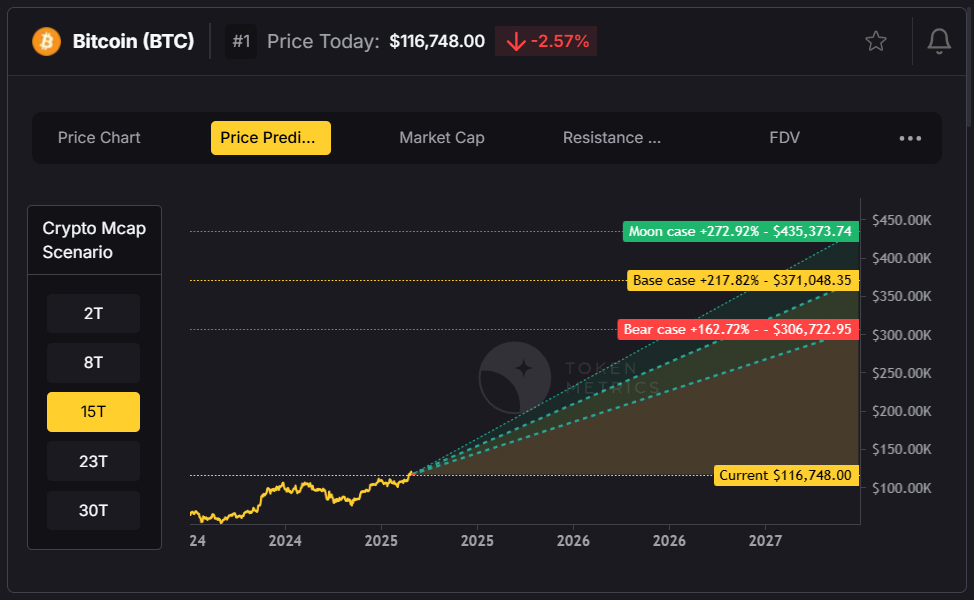
🔹 Exchange Reserve Monitoring
The platform tracks Bitcoin’s exchange reserves, showing a drop from 3.25M to 2.55M BTC—a bullish signal due to reduced sell-side pressure.

🔹 ETF Flow Analysis
Token Metrics integrates on-chain data and fund inflows to measure:
- How much BTC ETFs are buying
- Impact on liquidity and price
- Sentiment shifts among institutional investors
🔹 Alerts and Grades
You can set up custom price alerts for Bitcoin and receive Trader and Investor Grades based on 80+ real-time metrics.

These tools allow you to react faster than ETF investors relying on traditional media or quarterly reports.
📈 Bitcoin ETF Performance So Far
As of July 2025:
- BlackRock’s iShares Bitcoin Trust (IBIT) holds over $18B in BTC
- Fidelity’s ETF surpassed $12B in AUM
- ETF buying pressure is one of the main drivers behind Bitcoin’s 2025 bull run
💡 Pro Tips Before Investing in a Bitcoin ETF
- Compare fees across ETFs (lower = better for long-term holdings)
- Choose spot ETFs over futures ETFs for more accurate performance
- Use Token Metrics to track BTC signals and time your entry
- Understand your goals—ETFs are great for passive exposure but not for on-chain crypto utility
🧠 Final Thoughts
A Bitcoin ETF is one of the easiest ways to gain exposure to Bitcoin in 2025. Whether you’re a traditional investor looking to diversify or a crypto-native looking for a regulated option, ETFs offer accessibility, safety, and legitimacy.
But don’t stop at just buying shares—pair your ETF exposure with real-time intelligence from Token Metrics.
With institutional momentum accelerating, regulatory clarity improving, and AI tools like Token Metrics giving you an edge, there’s never been a better time to understand and invest in Bitcoin ETFs.
.png)
Hot Wallets vs. Cold Wallets: What’s the Difference and Which Crypto Wallet To Use in 2025?
%201.svg)
%201.svg)
As cryptocurrency adoption accelerates globally in 2025, one critical question for both beginners and experienced investors is: Where should you store your crypto assets safely?
The answer lies in understanding the difference between hot wallets and cold wallets — the two main categories of cryptocurrency storage. This highly informative and SEO-optimized blog will help you understand:
- What hot and cold wallets are
- Key differences between them
- Pros and cons of each
- Which one is right for you
- How platforms like Token Metrics help you choose and manage your wallet securely
🔐 What Is a Cryptocurrency Wallet?
A crypto wallet stores your private and public keys, enabling you to send, receive, and manage digital assets like Bitcoin, Ethereum, or altcoins. Unlike traditional bank accounts, crypto wallets give you full control over your funds — but with that control comes the responsibility of securing them.
Wallets are typically categorized as:
- Hot Wallets – connected to the internet
- Cold Wallets – offline storage solutions
⚡ What Is a Hot Wallet?
A hot wallet is a crypto wallet that is connected to the internet. It’s designed for easy access and quick transactions, making it ideal for active traders and everyday use.
🔹 Examples of Hot Wallets:
- Web wallets: MetaMask, Trust Wallet, Phantom, Rainbow
- Desktop wallets: Exodus, Electrum
- Mobile wallets: Coinbase Wallet, Atomic Wallet
- Exchange wallets: Binance, Coinbase (custodial)
✅ Pros of Hot Wallets:
- Instant access to crypto
- User-friendly interfaces
- Ideal for frequent trading or DeFi
- Compatible with most crypto platforms
❌ Cons of Hot Wallets:
- Vulnerable to hacks and phishing
- Depends on internet connection
- Risk of malware or keylogging
- Not ideal for large holdings
Hot wallets are often recommended for storing smaller amounts of crypto for daily use.
🧊 What Is a Cold Wallet?
A cold wallet refers to any crypto wallet that is not connected to the internet. It’s a form of offline storage designed for maximum security.
🔹 Examples of Cold Wallets:
- Hardware wallets: Ledger Nano X, Trezor Model T
- Paper wallets: Printed QR codes with private keys
- Air-gapped computers: Devices permanently offline
✅ Pros of Cold Wallets:
- Immune to online attacks
- Long-term storage for HODLing
- Control over private keys
- Ideal for institutional and high-net-worth users
❌ Cons of Cold Wallets:
- Less convenient for quick access
- Physical loss or damage is a risk
- Requires technical knowledge
- More expensive (hardware wallets can cost $50–$200)
Cold wallets are ideal for long-term investors storing large amounts of crypto.
🔄 Hot Wallet vs. Cold Wallet: Key Differences
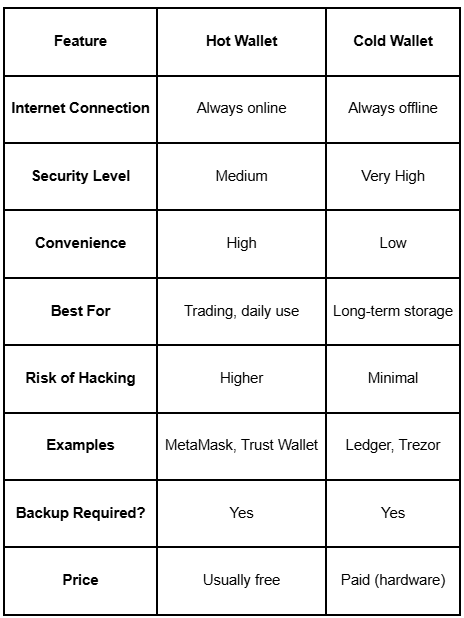
🔧 How to Use Hot and Cold Wallets Together (Hybrid Strategy)
Many crypto investors in 2025 use a dual-wallet strategy:
- Hot wallet for trading, staking, and DeFi
- Cold wallet for long-term storage and high-value assets
This balances convenience and security while minimizing exposure to threats.
For example:
- Use a hot wallet like MetaMask to access the Token Metrics Moonshots tab and buy trending altcoins.
- Transfer profits to your cold wallet (e.g., Ledger) for safekeeping.
🧠 How Token Metrics Helps You Manage Wallet Security
🔹 Wallet Integrations
Token Metrics supports:
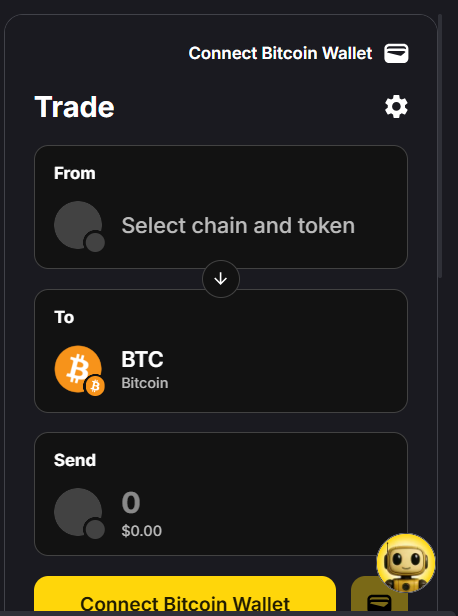
- MetaMask, WalletConnect, and other hot wallets
- Portfolio tracking synced with your wallet
- Real-time alerts when assets in your wallet are surging or at risk
🔹 Smart Trading with AI
Token Metrics helps reduce the need to frequently move funds by:

- Identifying only high-quality tokens using AI Trader and Investor Grades
- Sending price alerts, so you know when to buy/sell
- Providing in-platform swap tools for direct trades from your hot wallet
🔹 Moonshot Monitoring
For early-stage altcoins, timing is everything. Token Metrics lets you:

- Monitor your Moonshot investments
- Get notified when to take profits or exit
- Transfer to cold storage with a single click
🔒 Hot Wallet Security Tips (2025 Edition)
If you’re using a hot wallet:
- Enable 2FA (Two-Factor Authentication)
- Use a hardware wallet to sign large transactions
- Avoid clicking suspicious links or connecting to unknown dApps
- Disconnect wallets after use
Always back up your seed phrase and store it securely offline.
💬 Which Wallet Should You Use?
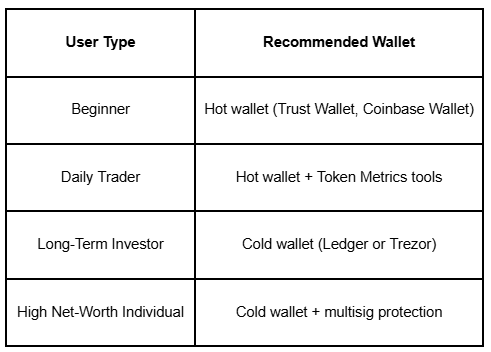
🧩 Final Thoughts
Whether you’re storing $100 or $100,000 in cryptocurrency, your wallet choice directly impacts your security, accessibility, and peace of mind.
- Hot wallets offer convenience, but must be used with caution
- Cold wallets offer security, but come with trade-offs in usability
- Platforms like Token Metrics bridge the gap by offering real-time insights, wallet integrations, and AI-driven trading tools
In 2025, don’t just store your crypto—store it wisely. Combine hot and cold wallet strategies and leverage tools like Token Metrics to build a secure, intelligent crypto portfolio.


Get Your Brand in Front of 150,000+ Crypto Investors!




 Create Your Free Account
Create Your Free Account9450 SW Gemini Dr
PMB 59348
Beaverton, Oregon 97008-7105 US
.svg)
No Credit Card Required


Online Payment


SSL Encrypted
.png)
Products
Subscribe to Newsletter
Token Metrics Media LLC is a regular publication of information, analysis, and commentary focused especially on blockchain technology and business, cryptocurrency, blockchain-based tokens, market trends, and trading strategies.
Token Metrics Media LLC does not provide individually tailored investment advice and does not take a subscriber’s or anyone’s personal circumstances into consideration when discussing investments; nor is Token Metrics Advisers LLC registered as an investment adviser or broker-dealer in any jurisdiction.
Information contained herein is not an offer or solicitation to buy, hold, or sell any security. The Token Metrics team has advised and invested in many blockchain companies. A complete list of their advisory roles and current holdings can be viewed here: https://tokenmetrics.com/disclosures.html/
Token Metrics Media LLC relies on information from various sources believed to be reliable, including clients and third parties, but cannot guarantee the accuracy and completeness of that information. Additionally, Token Metrics Media LLC does not provide tax advice, and investors are encouraged to consult with their personal tax advisors.
All investing involves risk, including the possible loss of money you invest, and past performance does not guarantee future performance. Ratings and price predictions are provided for informational and illustrative purposes, and may not reflect actual future performance.




%201.svg)

